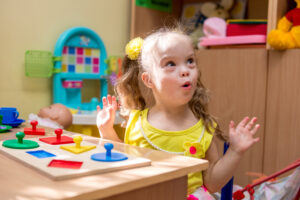Educational outcomes for children in the early years who need additional support are worsening, not improving, new research from council-representative body the Local Government Association (LGA) has found.
The report, Rising Needs in the early years, found that, despite the importance of the early years in improving the outcomes for children with special educational needs and disabilities (SEND), as well as those who are vulnerable or disadvantaged, councils and early years providers are consistently seeing an increase in volume and complexity of need.
In a survey carried out as part of the research, all councils that took part – and nine in 10 educators who responded – said they had seen an increase in early years needs, with respondents highlighting growth in the number of children with communication and interaction needs, and the complexity of those needs, as a particular challenge.
When asked how to improve support for early years children with additional needs, the report found three quarters (75%) of educators said better access to funding was needed and almost half (48%) called for more early years specialist provision. Meanwhile, two thirds (66%) of early years leaders said a national workforce strategy was needed to raise skills, with over half (56%) calling for reforms to both the school curriculum and the expectations in reception.
The LGA is calling on the government to boost inclusivity in the early years as part of wider reform to the SEND system in the Schools White Paper, expected in the new year.
In addition to calling for early years funding reform, cross-sector collaboration, and a wraparound system co-designed with families, it also recommends:
- a focus on ensuring children who are vulnerable, disadvantaged or who have SEND have access to funded entitlements
- earlier intervention, especially where children may not access education provision until reception year
- enabling providers to support children with SEND by developing a more proactive approach
- allocating resources to support transition from early years settings to reception year
- recognising early years educators for the professional role they play and as equal to their school counterparts
- developing a cohesive training and development plan for the early years workforce that is clear on child development and support for families of children with SEND.
The full list of recommendations set out by the LGA can be found here.
Councillor Amanda Hopgood, chair of the LGA’s children, young people and families committee, said: “The early years are a critical time in any child’s development. Getting it right in the early years and ensuring a seamless transition to reception can improve outcomes for children and families.
“We know that promoting inclusion and supporting children who need additional support is a core part of the Government’s Best Start in Life agenda and improving high quality early education take up and wraparound support will help councils to ensure more children reach a good level of development.
“This report highlights the significant challenges faced by councils and providers in supporting early years children with additional needs.
“We urge government to act on these concerns when it sets out its reforms to the education system.”



